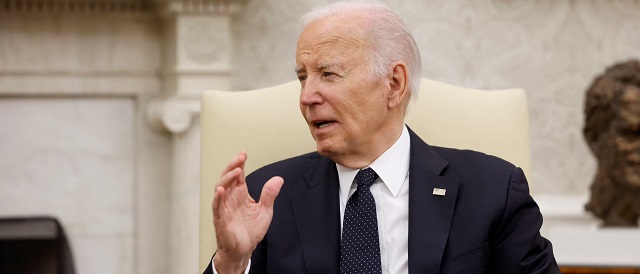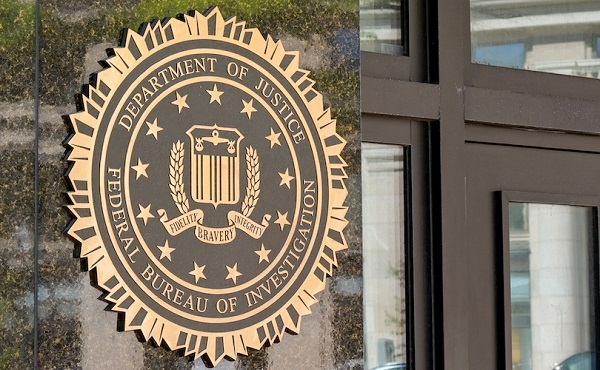Censorship Industrial Complex
Biden Agencies Have Resumed Censorship Collaboration With Big Tech, Dem Senate Intel Chair Says

 From the Daily Caller News Foundation
From the Daily Caller News Foundation
By JASON COHEN
Agencies in President Joe Biden’s administration have resumed their perceived disinformation censorship collaboration with social media companies, Senate Intelligence Committee Chairman Mark Warner told reporters at a recent security conference, Nextgov/FCW reported.
The administration stopped “misinformation” censorship collaboration with social media platforms after a July Missouri v. Biden ruling to prevent federal agencies from coordinating with social media companies, but recently restarted this work, Warner # reporters, according to Nextgov. He said the cooperation resumed as the Supreme Court heard oral arguments in the case, now called Murthy v. Missouri, in March, where multiple justices indicated they supported the Biden administration’s viewpoint that it has the right to work with platforms to combat what it believes is harmful content.
Democrat Senator Mark Warner says there’s a “voluntary agreement about disinformation and misinformation in elections” between “all 20 of the major social media companies” pic.twitter.com/YmIyAuJBrw
— RNC Research (@RNCResearch) April 21, 2024
“There seemed to be a lot of sympathy that the government ought to have at least voluntary communications with [the companies],” Warner said, according to Nextgoc. He also reportedly called on the Biden administration to take strong action against any foreign countries that try to interfere in the 2024 election.
The agencies include the Department of Homeland Security’s Cybersecurity and Infrastructure Security Agency (CISA) and the Federal Bureau of Investigation (FBI), according to NextGov.
“If the bad guy started to launch AI-driven tools that would threaten election officials in key communities, that clearly falls into the foreign interference category,” he added.
A district court judge issued an injunction in July preventing certain officials in agencies from the Department of Health and Human Services (HHS) to the FBI from communicating with social media platforms to censor speech, characterizing the government conduct exposed by the plaintiffs in the case as arguably “the most massive attack against free speech in United States’ history.”
Justices Sonia Sotomayor, Elena Kagan and Ketanji Brown Jackson, expressed concern during March oral arguments about restricting the government’s ability to persuade companies to take action when necessary, such as when terrorists disseminate speech on a platform.
The justices also questioned whether the plaintiffs could prove their platforms censored their speech as a direct result of the government.
Facebook executives believed they were engaged in a “knife fight” with Biden’s White House on COVID-19 censorship, according to a recent House Judiciary Committee report. Biden accused the platform of “killing people” in July 2021 for not censoring so-called COVID-19 misinformation, and unearthed WhatsApp messages between Facebook executives revealed that they were unhappy about the president’s remarks.
Warner, the White House and the FBI did not immediately respond to the Daily Caller News Foundation’s request for comment. CISA declined to comment, but notified the DCNF about an Election Security hearing in the coming weeks with the agency’s Director, Jen Easterly.
Censorship Industrial Complex
Global media alliance colluded with foreign nations to crush free speech in America: House report

From LifeSiteNews
By Dan Frieth
The now-defunct ad coalition GARM shared insider data and urged boycotts of Twitter to punish non-compliance with its ‘harmful content’ standards, a US House Judiciary report shows.
A new report from the U.S. House Judiciary Committee has shed light on what it describes as an alarming collaboration between powerful corporations and foreign governments aimed at suppressing lawful American speech.
The investigation focuses on the Global Alliance for Responsible Media (GARM), an initiative founded in 2019 by the World Federation of Advertisers (WFA), which the committee accuses of acting as a censorship cartel.
According to the report, GARM, whose members control about 90 percent of global advertising spending, exploited its market dominance to pressure platforms like Twitter (now X) into compliance with its restrictive content policies.
A copy of the report can be found HERE.
The committee highlighted how GARM sought to “effectively reduce the availability and monetization” of content it deemed harmful, regardless of public demand for free expression.
Documents obtained by the committee reveal direct coordination between GARM and foreign regulators, including the European Commission and Australia’s eSafety commissioner.
In one exchange, a European bureaucrat encouraged advertisers to leverage their influence to “push Twitter to deliver on GARM asks.”

Similarly, Australia’s eSafety Commissioner Julie Inman Grant praised GARM’s “significant collective power in helping to hold the platforms to account” and sought updates to “take into account in our engagement and regulatory decisions.”

Robert Rakowitz, GARM’s co-founder and initiative lead, expressed a chilling goal in private correspondence, stating that silencing President Donald Trump was his “main thing” and likening the president’s speech to a “contagion” he aimed to contain “to protect infection overall.”

The report outlines how GARM distributed previously unavailable non-public information about Twitter’s adherence to its standards, fully aware this would prompt advertisers to boycott the platform if it failed to conform. According to the House report, Rakowitz admitted that this information sharing was designed to encourage members not to advertise on Twitter.
He went as far as to draft statements urging GARM members to halt advertising on the platform, telling colleagues he had gone “as close as possible” to saying Twitter “is unsafe, cease and desist.”
Despite the widespread impact of GARM’s actions, including what the committee describes as coerced “concessions” from platforms, internal polling circulated within GARM showed that “66 percent of American consumers valued free expression over protection from harmful content.”
Still, GARM pressed ahead with efforts to “eliminate all categories of harmful content in the fastest possible timing,” ignoring consumer preferences.
Even after GARM dissolved in 2024 amid legal challenges, similar efforts persisted.
A new coalition led by Dentsu and The 614 Group briefly attempted to revive GARM’s mission before disbanding under scrutiny. Gerry D’Angelo, a former GARM leader, reflected on the initiative’s overreach, stating, “Did we go too far in those first rounds of exclusionary restrictions? I would say yes.”
The Judiciary Committee warns that despite GARM’s downfall, the threat of collusion to stifle free expression remains.
It pledged to continue oversight to defend “the fundamental principles” of the Constitution and ensure that markets, not coordinated censorship efforts, shape the flow of information in the digital age.
Reprinted with permission from Reclaim The Net.
Censorship Industrial Complex
FBI urged to release withheld records on Hunter Biden laptop, other ‘Twitter Files’

From LifeSiteNews
By Dan Frieth
Judicial Watch initiated the lawsuit in April 2023, targeting the DOJ, the Department of Homeland Security, and the Office of the Director of National Intelligence
A hearing took place Wednesday, before U.S. District Judge Sparkle L. Sooknanan, in a Freedom of Information Act (FOIA) lawsuit brought by Judicial Watch against the Department of Justice (DOJ).
The case seeks records related to the “Twitter Files,” particularly those involving Hunter Biden’s laptop and allegations of censorship.
The only matter still pending is the FBI’s withholding of records detailing two meetings between agency officials and Twitter representatives from the Biden administration.
Judicial Watch initiated the lawsuit in April 2023, targeting the DOJ, the Department of Homeland Security, and the Office of the Director of National Intelligence.
The legal action followed the FBI’s failure to respond to a December 2022 FOIA request for communications between FBI personnel and key Twitter figures, including Yoel Roth, Vijaya Gadde, and Jim Baker, from June 2020 to December 2022.
These individuals were involved in discussions about suppressing the New York Post’s Hunter Biden laptop story, as disclosed in journalist Matt Taibbi’s December 2022 “Twitter Files.”
Tom Fitton, president of Judicial Watch, expressed strong disappointment: “It is frustrating beyond belief for Judicial Watch to have to go to federal court for basic information on Biden’s abuse of the FBI, using Twitter to censor and monitor Americans.”
Through a mix of FOIA requests and legal action, Judicial Watch continues to document extensive censorship efforts that affected tens of millions of Americans.
In November 2024, it obtained DHS records showing a widespread campaign, by both government and private groups, to police and suppress social media posts concerning election fraud in 2020.
Additional records from June 2024, released through Judicial Watch litigation, revealed that just before and after the 2020 election, state officials flagged alleged misinformation and sent it to entities like the Center for Internet Security, CISA, and the Election Integrity Partnership (EIP), a DHS-backed nonprofit known for targeting online election discourse.
In December 2023, DHS documents exposed coordination between CISA and the EIP to conduct “real-time narrative tracking” on major social media platforms in the run-up to the 2020 vote.
Similar records surfaced in November 2023, showing EIP’s influence over platforms such as Google, Twitter, Facebook, TikTok, Pinterest, and Reddit to suppress “disinformation.”
Reprinted with permission from Reclaim The Net.
-

 COVID-192 days ago
COVID-192 days agoOntario man launches new challenge against province’s latest attempt to ban free expression on roadside billboards
-

 Energy2 days ago
Energy2 days agoThis Canada Day, Celebrate Energy Renewal
-

 COVID-1915 hours ago
COVID-1915 hours agoNew Peer-Reviewed Study Affirms COVID Vaccines Reduce Fertility
-

 Business11 hours ago
Business11 hours agoOttawa Funded the China Ferry Deal—Then Pretended to Oppose It
-

 Alberta1 day ago
Alberta1 day agoAlberta Next Takes A Look At Alberta Provincial Police Force
-

 Alberta2 days ago
Alberta2 days agoCanadian Oil Sands Production Expected to Reach All-time Highs this Year Despite Lower Oil Prices
-

 MAiD13 hours ago
MAiD13 hours agoCanada’s euthanasia regime is not health care, but a death machine for the unwanted
-

 International2 days ago
International2 days agoPresident Xi Skips Key Summit, Adding Fuel to Ebbing Power Theories





